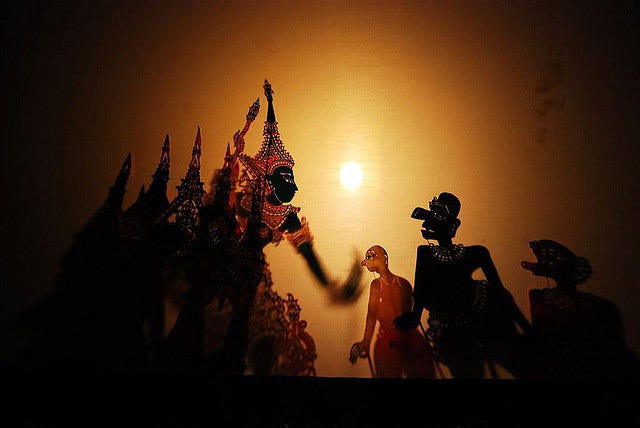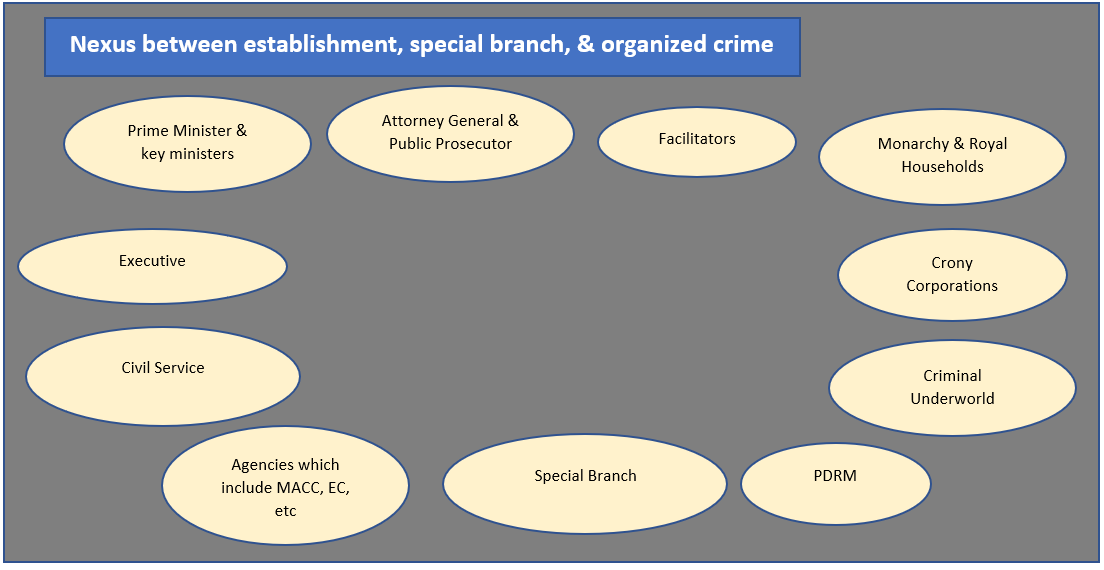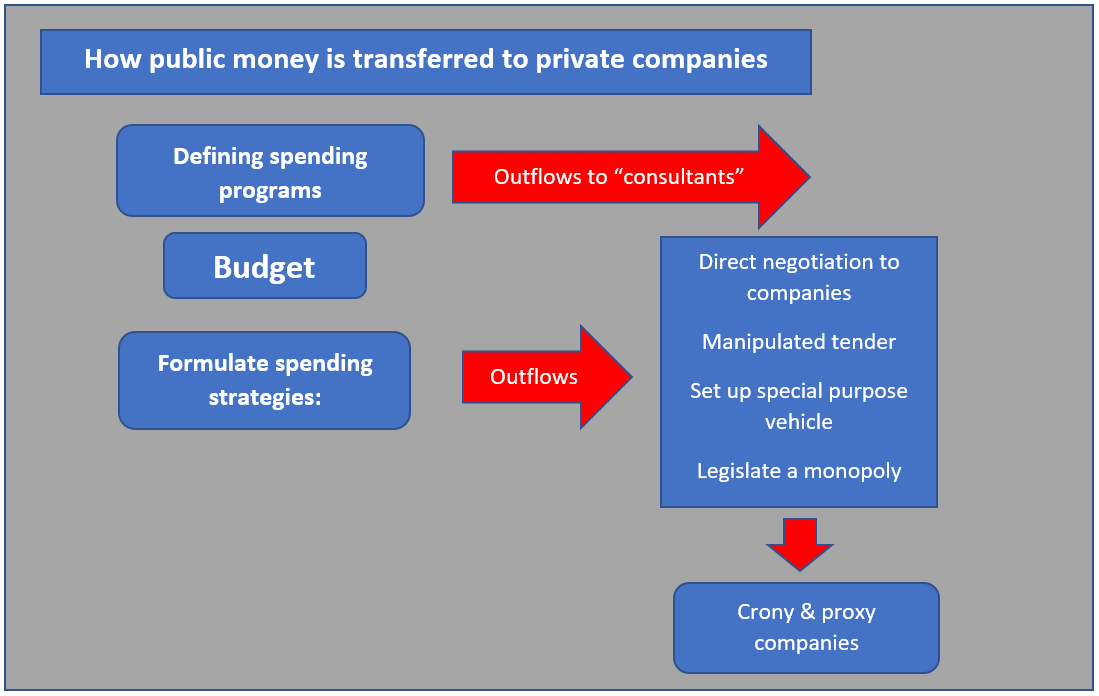The major objective of the ‘so called deep state’ is to seek, secure, and exploit rent-seeking opportunities, engineered by the players within the ‘political-institutional environment’. These ‘engineered opportunities’ are created through legal monopolies, favouring certain parties, while keeping procurement opaque. Parties within the system protects the players from facing investigation and prosecution, over any charges of abuse of power.
The ’so called deep state’ refers to an ad hoc and liquid set of institutions, agencies, crony corporations, and individuals, who are able to act ultra vires to the legal system with almost absolute impunity. ‘Engineered opportunities’ are legal or illegal activities that are able make profits. The ‘political-institutional environment’ relates to the cast of entities that enable the facilitation of profit-centred activities (see figure 1.).
Figure 1: The ‘political-institutional environment’ or ‘deep state’ in Malaysia
Major institutions and players
The deep state can be metaphorically described as a moving kaleidoscope of institutions, agencies, corporations, organized crime, cronies, and facilitators that undertake activities aimed towards making profits within the ‘political-institutional environment’.
There is no central leader, no ‘big picture’ objective, other than the pursuit of profits, at many levels.
The players are described below:
Prime ministers, key ministers, and the executive
The key element of the ‘so called’ deep state is the prime minister. The power of others greatly depends upon how the prime minister exerts his own power.
Mahathir was a very powerful prime minister. He pushed the Royal households into a defence position. He had loyalty from the Special Branch. He invented crony capitalism, alongside his deputy prime minister Anwar Ibrahim. He set up a conglomerate of UMNO companies, run by proxies to fund the party.
Abdullah Ahmad Badawi left much of his power in the hands of a group called “the fourth floor boys”, led by his son in law Khairy Jamaluddin. Najib Razak set up a sovereign fund 1Malaysia Development Berhad, which resulted in a massive financial scandal, which put Najib behind bars. Najib enhanced the Malaysian External Intelligence Organization (MEIO) to rival Special Branch, which he didn’t trust.
Both Najib and Badawi’s administration before him, outsourced much government work to consultants to redistribute income towards crony businesses. The balance of power greatly differed between each administration. A vibrant company consulting for the federal or state government, could go bankrupt, after a change of administration, when incoming prime ministers and chief ministers channelled government business to other firms.
The various ministries are best seen as small empires, where ministers and their political staff have influence over the spending of budget allocations, and contracts. The home minister is a very vital, as both the police and attorney general are placed under the home ministry.
Political Benefactors
The recently convicted John Soh Chee Wen in Singapore over the Penny stock crash, had been assisting politicians since the early 1990s. Soh helped finance and facilitate with the Malaysian Chinese Association (MCA) until the late 1990s. Soh switched his support to Anwar Ibrahim, after becoming good friends in the late 1990s, supporting Anwar during the early ‘Reformasi’ period. It is believed he supported the growth of Parti Keadilan Rakyat during the developing years and even purchased the PKR headquarters building in Petaling Jaya for the party.
Perhaps Malaysia’s most infamous benefactors was Koo Tam Yam, one of the four major gangland leaders, nicknamed the ‘Heavenly kings’. Koo is believed to have abandoned his underworld activities and invested in a firm, Caerly Holdings Bhd. Koo is believed to have funded Mahathir Mohamed, Abdullah Ahmad Badawi, and now Anwar Ibrahim. Koo held a large free diner for Anwar in 2018, when he was running for the seat of Port Dickson.
The criminal underground
The criminal underworld is a vital part of the deep state. There is a very strong connection between politicians, the police, and even some parts of Royal households. These are very complex relationships, with intertwining company directorships in many companies, that legitimize the criminal element and launder money.
The activities some of these criminal elements carry out include is the distribution of narcotics, human trafficking, prostitution, employment scams, foreign workers, money laundering, and even counterfeiting. Very few of these operations are ever uncovered due to police complicity, and selective prosecution. A whistle-blower recently described how some of the top officers are taking bribes to prevent investigation.
Facilitators
There are many facilitators who have close relationships with business, Royal households, civil servants, and politicians. These people facilitate what needs to be done in order to connect and coordinate with other players. These include both short-term and long-terms relationships between parties.
The most well known example was the appointment of the former Inspector General of Police (IGP) Mohammed Hanif Omar to the board as an executive deputy chairman for Genting Malaysia Berhad. Hanif was also a director of Binariang, Arab Malaysia Holdings, and a number of Renong companies. Hanif would act as a go-between of parties, and built a private police force for Genting.
Royal Families
The monarchy is based upon nine old Malay Sultanates that came together with Melaka, and Penang to form Malaya. Although, technically constitutional monarchies, the royal households are the apex of an ancient Malay class-based feudal system. To some degree Malaysia is still a patriarchy, rather than a full-functioning democracy.
The sultans (Agong) have much discretion to appoint a chief minister (prime minister), within their respective states. Most of the sultans’ selections are not tested on the floor of the parliament and assemblies to confirm they carry a majority of support on the floor of the house.
The monarchy also has a say in important appointments. The YDPA, or king delayed the appointment of Tommy Thomas as attorney general and Tengku Maimun Tuan Mat as the chief justice for more than two months.
The monarchy has tremendous informal power. Sultans hold regular meetings with their executive councils, which provide them an opportunity each week to give their views on the running of the state. Sultans also make regular trips to state departments, agencies, universities, schools, military bases, and mosques. The heads of these state institutions are invited to the palace on both official and social occasions. The majority of members within the civil service are loyal to the sultans. In the eyes of some, loyalty to Tuanku, overrides loyalty to the elected government.
All the royal households have developed their own business empires. Most prime ministers and chief ministers are subservient to monarchy over issues regarding land and business concessions. Protected forests have been de-gazetted and handed over as concessions to companies linked to royal households. Anwar Ibrahim is expected to behave in a similar manner. During the last Pakatan Harapan government, more draconian legislation was introduced to stiffen penalties for criticism of the monarchy.
Civil Service
The civil service is a major component of the deep state. The civil service plays a role in structure and process facilitation. Most federal budget spending is channelled through ministries and their satellite agencies. Its within ministry procedures that money flows for allocated purposes.
Therefore, political leaders and their staff must rely upon the civil servants within the ministries to direct funds into selected contracts. Through selective special purpose ventures, operated either by cronies or proxies are the beneficiaries of these funds. Getting things done, requires collaboration between people within the political and administrative arms of government.
Within the deep state paradigm, ministries should be viewed at semi-independent empires, which can set up agencies or business subsidiaries. Its within these agencies and business entities that financial activities escape the direct view of the government auditors.
From the financial scandals listed below, it can be seen which ministries are important.
1Malaysia Development Berhad – Finance Ministry
SG Networks – Communications Ministry
Littoral Combat Ships – Defence Ministry
Mysajathera – Health Ministry
ECRL – Finance Ministry
Sabah Gas Pipeline – Finance Ministry
Sabah Solar Panel – Finance Ministry
Scorpene Submarines – Defence Ministry
Port Klang Free Port – Transport Ministry
The Home Ministry is extremely powerful. The liaison with the Royal Malaysian Police (PDRM), and Special Branch has great impact upon the security of the actors within the deep state. This influence depends upon the minister in charge, and the quality of personal relationship with the Inspector General of Police (IGP), and head of the Special Branch. There is also a belief that extra-judicial activities are undertaken from rogue officers within the PDRM to protect the interests of actors within the deep state. Some of these rogue agents work in tandem with organized crime to undertake threats, blackmail, intimidation, incrimination, humiliation, and even elimination.
The Malaysian Anti-Corruption Commission (MACC), operates under the attorney general, who decides who should be prosecuted by the body. The MACC is not an independent body. Over the last few decades, the MACC has been used to selectively prosecute political enemies of those in power.
How public monies are leaked to private companies is shown in figure 2 below.
Figure 2: How public money is transferred to private companies.
Special Branch
The Special Branch (SB) is the most secretive division within the Royal Malaysian Police (PDRM). The SB is the nation’s premier covert and intelligence unit. Although the former Inspector General of Police (IGP) Abdul Hamid Bador denied accusations the SB has no operational capabilities, it is generally believed to have been behind the disappearance of two social activists, Amri Che Mat, and Pastor Raymond Koh.
Without any public charter, the SB is basically free to operate the way it wants. Being a division within the PDRM, hides the SB even more. The SB has infiltrated most organizations within Malaysia, including federal and state civil services, government agencies, media organizations, and even the Prime Minister’s Office.
The unit has excellent relations with most of the Royal households.
The political division within the SB conducts propaganda and misinformation campaigns to influence public opinion. The SB is believed to have good cooperative links with social media platforms. The SB also conducts ‘turning operations’ to change the views of targeted people. Wikileaks revealed correspondence between Australian and Singaporean intelligence organization, where the Singapore agency told the Australians that sodomy charges against Anwar Ibrahim was the result of a ‘honey trap’ set up by the SB.
Today, the SB has a budget in excess of RM 500 million, which doesn’t include slush funds to carry out sensitive operations. The SB has more than 10,000 staff, and 10-15,000 informants across the country and overseas.
Crony Capitalists
There are a number of closely affiliated crony capitalists who carry special favour with past prime ministers. They are given special concessions, GLCs on soft terms, granted monopolies, or given special projects. Most of these businesses are rent-seeking activities, which provide bumper profits. Perhaps the best way to describe these companies are Politically Linked Corporations (PLCs), as opposed to GLCs.
The best known crony capitalist is Syed Mokhtar Albukari. The Albukhari Group of companies includes DRB-HICOM, Tradewinds Plantations, and the Bernas rice monopoly. Albukhari was also awarded a lucrative 5G concession by the Ministry of Communications and Multimedia through ALTEL.
Other politically linked business people include Vincent Tan Chee Yioun, who leads the Berjaya Corporation, and Ananda Krishnan, who controls Astro, MEASAT, and MAXIS.
Former prime minister Mahathir Mohamed, and his then deputy prime minister attempted to create and elite group of Malay billionaires back in the 1990s. There was a host of politically linked business people, which included Halim Saad, who then controlled the UEM-Renang group until 2001, Taijuddin Ramli, who took over and private the national airline Malaysia Airlines, and was bailed out after a few years, and Eric Chia, who drove Perwaja steel to the ground.
Over the years, there have been a number of other business people who were given opportunities. One was Abu Sahid Mohamed and his Maju Holdings group. Tony Fernandez was given a debt ridden failed airline, Air Asia by former prime minister Mahathir for RM 1.
The government was also used to bail out crony business people. Petronas, a GLC, bailed out Mahathir’s eldest son Mizan’s company, Konsortium Perkapalan in 1998.
Over the years, many business people had close connections to Malaysia’s top politicians, who assisted them in business. After GLCs, PLCs are perhaps the second highest capitalised group of companies within Malaysia.
There is no level playing field in Malaysian business. Even the new prime minister Anwar Ibrahim won’t break them up.
Economic Planning Unit (EPU)
The Economic Planning Unity (EPU) five year plan preparation is abused when political leaders force through priority projects, where PLCs will gain the bulk of grants, incentives, and contracts. Five year plans are a major method where funds can be redistributed towards PLCs. The plan to develop the aerospace industry in the 12th Malaysian Plan is one such example. Many projects channelled through five year plans end up as white elephants. The real motivation behind some projects is to profit on the construction and supply of equipment, rather than produce a worthwhile community asset.
The most prized asset of the above system is that power is abused by making laws, manipulating tenders and procurements, and favouring specific firms, can be undertaken without any accountability. This is the most important source of power the Malaysian political-bureaucracy has. Many of the players avoid any criminal prosecution due to the selective investigation and prosecution the attorney general and MACC make. Even if there is a prosecution, the prosecutors may make such a weak case, the defendant gets acquitted in court.
Conclusion
The deep state is a major reason why the Malaysian economy is primarily based upon rent-seeking activities, rather than innovative based activities. The deep state is holding up any type of deregulation, and not breaking up artificial monopolies.
Its very quickly becoming apparent, the new government will also not intervene in this area.
One of the most powerful bonds of the deep state is the ‘school tie’, and the comradery that comes from it. This comes from a privileged education for the children of the elite Malay class. The belief within some political circles that ‘ada kuasa, boleh jadi kaya’ (have authority, you can become rich), and ‘we are the law’, perpetuates this deep state culture in Malaysia.
Much of this article was made possible from documents sent to the author. Many names and details have been omitted, and only a brief outline given.
Originally published in the Eurasia Review 1st February 2023
Subscribe Below:





The bankers will ensure we stay in debt
The pharmaceutical companies will ensure we stay sick.
The weapons manufactures will ensure we keep going to war.
The media will ensure we are prevented from knowing the truth.
The government will ensure all of these is done legally.
Once you understand that, you understand everything
Pretty insightful . I believe this is only the tip of the iceberg...